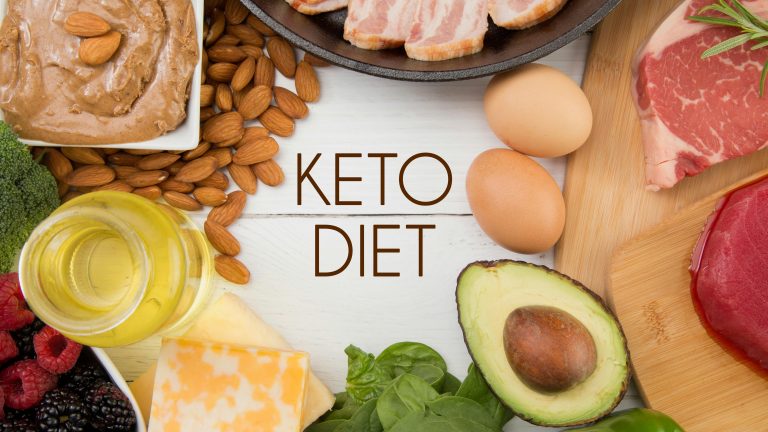INTRODUCTION
In recent years, the ketogenic diet has become a powerful tool for weight loss, improved metabolic health, and enhanced cognitive function. At the heart of this diet is a metabolic state known as ketosis. But what exactly is ketosis? How does it work and why has it become such a hot topic in health and wellness? In this comprehensive guide, we’ll dive into the basics of ketosis, exploring the science, benefits, and practical applications. Whether you’re considering a ketogenic lifestyle or are simply curious about the science behind it, this article will provide you with a solid foundation.

What is ketosis?
Ketosis is a natural metabolic state in which the body burns fat instead of carbohydrates for fuel. Normally, the body’s main source of energy is glucose (sugar) from carbohydrates. However, when carbohydrate intake is drastically reduced, your body must find other sources of fuel. This is where ketosis comes in.
During ketosis, the liver converts stored fat into molecules called ketones. These ketone bodies are then used by cells as an efficient source of energy. The process of entering ketosis usually takes anywhere from a few days to a week, depending on individual factors such as diet, activity levels, and metabolic health.
The Science Behind Ketosis
To understand ketosis, it’s important to grasp the fundamentals of human metabolism. Our bodies have evolved to be highly adaptable, able to use different types of fuel based on availability. Here’s a simplified overview of how ketosis works:
Reduced Carbohydrate Intake: When you drastically limit your carbohydrate intake (usually less than 50 grams per day), your body’s glucose stores are depleted.
Increased Fat Oxidation: With less glucose available, the body begins to break down stored fat into fatty acids. These fatty acids are then transported to the liver.
Production of Ketone Bodies: In the liver, fatty acids are converted into ketone bodies through a process called ketogenesis. The main ketone bodies produced are acetoacetic acid, beta-hydroxybutyric acid (BHB) and acetone.
Ketone Body Utilization: These ketone bodies are released into the bloodstream and used as an alternative energy source by cells, including brain cells. This shift in metabolism allows the body to maintain normal function despite relying primarily on fat for fuel.
Origins of Ketosis
Ketosis is not a new concept. In fact, it has been part of human metabolism for thousands of years. Our ancestors often went through periods of fasting or limited food availability, during which their bodies would naturally enter a state of ketosis. This metabolic flexibility allowed them to survive and thrive in an environment where carbohydrates were scarce.
In modern times, ketosis was first studied in the context of treating epilepsy.In the 1920s, researchers found that a high-fat, low-carbohydrate diet reduced the frequency of seizures in children with epilepsy. This early research laid the groundwork for the modern ketogenic diet, which has since been explored for its potential benefits in weight management, metabolic health, and more.
Benefits of Ketosis
The ketogenic diet has gained popularity primarily because of its many potential health benefits. Here are some of the most compelling benefits of entering and maintaining a state of ketosis:
Weight Loss: One of the most appealing benefits of ketosis is its potential for rapid, sustained weight loss. By switching to a fat-based metabolism, your body burns stored fat more efficiently for energy. Additionally, the high-fat nature of the ketogenic diet helps reduce appetite and cravings, making it easier to maintain a calorie deficit.
IMPROVES METABOLIC HEALTH: Ketosis has been shown to improve several key indicators of metabolic health, including insulin sensitivity, blood sugar levels, and lipid profiles. By reducing carbohydrate intake, the risk of developing type 2 diabetes and other metabolic disorders can be reduced.
Enhanced Cognitive Function: Many people report improved mental clarity, attention, and concentration while in ketosis. Ketone bodies are a potent source of fuel for the brain, and some studies suggest that ketones may have neuroprotective effects, potentially reducing the risk of neurodegenerative diseases such as Alzheimer’s.
ENHANCED ENERGY LEVELS: Once your body adapts to using ketones as fuel, many people experience a significant increase in energy levels. This is because ketones provide a more stable and consistent source of energy compared to glucose, which can lead to low energy and fatigue.
Reduces Inflammation: Chronic inflammation is a common underlying factor in many diseases. A ketogenic diet has been shown to reduce indicators of inflammation in the body, thereby reducing the risk of diseases such as heart disease, arthritis, and certain cancers.
Improved athletic performance: While the effects of ketosis on athletic performance vary from person to person and by type of activity, many athletes report improved endurance and reduced muscle fatigue while following a ketogenic diet. This is due in part to the increased availability of fat as a fuel source and decreased reliance on glycogen.
How to enter ketosis
To enter ketosis, your eating habits must change significantly. Here are some key steps to help you make a smooth transition:
Limit your carbohydrate intake: The first and most critical step is to reduce your carbohydrate intake to less than 50 grams per day. This includes eliminating foods such as bread, pasta, rice, sugary snacks and most fruits.
Increase Healthy Fats: To replace the calories lost from carbohydrates, you need to increase your intake of healthy fats. Sources of healthy fats include avocados, nuts, seeds, olive oil, coconut oil and fatty fish such as salmon.
Consume Protein in Moderation: While protein is essential for maintaining muscle mass and overall health, too much protein can interfere with ketosis. Protein should be consumed in moderation, with a focus on high-quality protein sources such as grass-fed meats, poultry, eggs and dairy products.
STAY HYDRATED AND MONITOR ELECTROLYTE: Staying hydrated is crucial when entering ketosis. It’s also important to monitor electrolyte levels, as low-carbohydrate diets can sometimes lead to electrolyte imbalances. Consider supplementing with sodium, magnesium and potassium to maintain optimal hydration and reduce symptoms such as muscle cramps and fatigue.
BE PATIENT AND PERSEVERANCE: Entering ketosis can take anywhere from a few days to a week, and some people may experience temporary side effects during the transition, such as fatigue, brain fog, and irritability. These symptoms are often referred to as the “keto flu” and usually subside within a few days as the body adjusts to its new metabolic state.
Measuring Ketosis
If you are following a ketogenic diet, it is important to know if you are actually in ketosis. There are several ways to measure ketone levels:
Breathalyzers: These devices measure acetone levels in the breath. They are convenient and non-invasive, but may not be as accurate as other methods.
Urine Test Strips: Urine test strips measure acetoacetic acid levels and are an affordable way to monitor ketosis. However, this method may be less reliable as the body adapts to the production and use of ketone bodies.
Blood Tests: Blood tests measure beta-hydroxybutyric acid (BHB) levels and are considered the most accurate method. While more costly, they provide an accurate measure of your ketone body levels and overall metabolic state.
Common Challenges and Ways to Overcome Them
Transitioning to a ketogenic lifestyle can come with some challenges. Here are some common problems and tips for overcoming them:
Ketogenic Flu: As mentioned earlier, the initial transition to ketosis may be characterized by temporary symptoms such as fatigue, brain fog, and irritability. To mitigate these effects, stay hydrated, increase salt intake, and consider electrolyte supplementation.
SOCIAL AND DINING CHALLENGES: Eating out or attending social gatherings can be tricky while on a strict ketogenic diet. Plan ahead by researching ketogenic diet-friendly restaurants or bringing your own snacks to events.
Cravings and Appetite: While ketosis can help reduce cravings over time, restricting carbohydrates can be tough initially. Focus on eating satisfying, high-fat meals and consider adding low-carb snacks like cheese, nuts, or olives to curb hunger.
Nutritional Deficiencies: Ketogenic diets can sometimes lead to deficiencies in certain vitamins and minerals, especially if you don’t eat a wide variety of foods. Consider taking a multivitamin supplement and make sure to consume plenty of leafy greens, nuts and seeds.
Sustainability: Sticking to a ketogenic diet for the long term can be challenging for some people. It’s important to find a balance that works for your lifestyle and remain flexible. Don’t be too hard on yourself if you experience setbacks. Focus on making changes that can be sustained over time.
Ketosis and Medical Considerations
While the ketogenic diet is beneficial for many people, it is not without potential risks and considerations. Here are some key points to keep in mind:
CONSULT A DOCTOR: It’s crucial to consult a healthcare professional before starting a ketogenic diet, especially if you have any pre-existing medical conditions. Conditions such as diabetes, kidney and liver disease may require special consideration or adjustment.
Monitor Blood Sugar: For diabetics, the ketogenic diet can seriously affect blood sugar levels. It is important to closely monitor blood sugar levels and adjust medications as needed under the guidance of your healthcare provider.
POTENTIAL SIDE EFFECTS: While generally safe for most people, some may experience side effects such as constipation, bad breath, or altered menstrual cycles. These problems are usually temporary and can often be managed with dietary adjustments or supplements.
Long-term effects: Research on the long-term effects of the ketogenic diet is still ongoing. While many people report sustained benefits from the ketogenic diet, it’s important to keep an eye on your overall health and make adjustments as needed.
Practical Tips for a Successful Ketogenic Journey
Starting a ketogenic lifestyle can be an exciting and rewarding experience. Here are some practical tips to help you succeed:
Educate yourself: Understanding the science behind ketosis and the ketogenic diet will help you make informed decisions and stay motivated. Read books, follow well-known blogs and join the ketogenic community to learn more.
PLAN MEALS: Meal planning is key to sticking to the ketogenic diet. Spend some time each week planning and preparing meals and snacks that are appropriate for a ketogenic diet. This will help you avoid temptation and ensure you have nutritious options readily available.
TRY RECIPES: Don’t be afraid to get creative in the kitchen. There are countless delicious keto recipes online, from low-carb versions of your favorite comfort foods to innovative new dishes. Experimenting with different ingredients and flavors will make your ketogenic journey more enjoyable.


